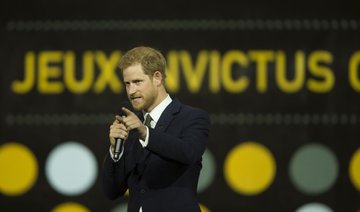DUBAI: They are some of the Middle East’s bravest war veterans and, having suffered injury in the line of duty, they are showing their strength and resilience in a different arena: sport, at the fourth Invictus Games this week in Sydney.
Among more than 500 athletes participating in the international adaptive multi-sport event created by the UK’s Prince Harry for wounded, sick and injured service personnel, there are 23 competitors from two Middle Eastern countries: 17 from Jordan and seven from Iraq.
As the competition heats up, Jordanian participants have already topped the league table in some events. On Monday, Amany Akram Khaled Abdel Rahman, 29, won gold in the women’s IR2 one-minute sprint indoor-rowing competition, and second place was awarded to fellow Jordanian competitor, 32-year-old Ulfat Yaseen Ahmad Al-Zwiri.
Also during Day 3, Amjed Nashat Ali Ayasrah and Jafar Al-Maradat of Jordan competed in the sitting volleyball match against Afghanistan, which it won before losing to the UK.
After having his right leg amputated following an accident on a tour of duty with the Jordan Armed Forces, Al-Maradat found a love of sport again, which helped his health – physically and mentally.
“Playing sports following my injury changed my whole outlook on life,” said the retired serviceman, who competed for the first time. “It has helped me build new friendships and meet other disabled soldiers.”
Al-Maradat hails from the southern city of Karak and commutes for three hours to train with fellow colleagues who are now part of his close inner circle of support. He credits embracing sports and the immense training and preparation for the Games as an integral part of his recovery and building a life after the army, where he served between 1993 and 2014.
“Playing sports has helped in the transformation of my daily routine and has given me a push forward,” he said.
Ayasrah, from Jerash in northern Jordan, has been an active sergeant in the Gendarmerie Forces since 2009 and had an amputated leg as a result of a gunshot wound.
He was competing for the second time in sitting volleyball. “Although I am still working, playing sports and representing my country at the Invictus Games made a big change in my life,” he said. “Sports was never in my daily routine, but my previous participation was a great experience.”
Since losing the sight in his left eye after being exposed to chemicals while on duty, fellow Jordanian competitor and former soldier Jehad Bani Omar admitted he found it “hard to cope” at first when his injury led to his retirement from the Jordan Armed Forces.
After a long road to recovery, Omar said he “eventually accepted” his fate and turned his life around after embracing physical activity.
“Sports have revived my self-confidence and renewed my energy levels,” said the retired soldier, who will be competing in athletics (shot put) and defending the gold medal he won in the Games in Orlando in 2016. “I am excited about the Invictus Games and have been preparing for them persistently,” he said. “I appreciate the international event – it shows concern for wounded soldiers.”
Jordanian competitor Nayef Al-Zboon comes from the Mafraq governorate. The landmine survivor, who had his leg amputated, competed for the second time in sitting volleyball and said he always looks forward to training, even on holiday.
“Sports has given me a challenge and something to look forward to,” said the retired serviceman, adding that he sees his participation as a unique opportunity to meet military personnel who share the same experiences.
Female competitor Ulfat Al-Zwiri, a civilian staffer in the Jordan Armed Forces since 2008, developed incomplete paraplegia after a car accident while on duty. “My injury inspired me to challenge myself and not to give up, and I see sports as a source of willpower and determination,” said Al-Zwiri, who is participating in the (100m) wheelchair race and in rowing. “Participating gives me the drive to fulfil my full potential and is also a good opportunity for me to represent my country in the best way I can.”
She prepared continuously to ensure that she would achieve advanced results and said her previous participation in the Games helped increase her confidence and to meet other military personnel with similar types of injuries from different countries and cultures.
“I am hopeful that my previous experience in the Games will help me achieve good results in this year’s competition as well,” she said.
Amany Abdel Rahman, a civilian staffer in the Jordan Armed Forces since 2008, has paralysis in her lower body owing to an illness while on duty.
Of her injury, she said: “Life must go on.” She described overturning her life by embracing sport and is participating in the (100m) wheelchair race at the Invictus Games.
“I feel proud to be raising the Jordanian flag and am really looking forward to hearing the national anthem on an international platform,” she said. “I am highly motivated and driven to achieve outstanding results.”
Jamal Damra, a retired serviceman of the Jordan Armed Forces, was shot while on duty, and his right leg was amputated under the knee. “The injury does not mean the end of life as I can still do daily activities,” he said. “Sports gave me the chance to be more involved in my community to boost my own recovery, but also to promote positive social change.”
Damra trains every day and participated in sitting volleyball and athletics (shot put). His team did well last year and won the gold medal in athletics, but he is “even better prepared this time” and is ready to excel again. He sees his participation as a “unique opportunity to meet military personnel from different countries.”
Riyad Al-Mazaydeh comes from the southern desert region of Qatranah. He has served in the Jordan Armed Forces since 2005 and is an active sergeant at the Royal Medical Services after he was injured in an accident while on duty in the artillery division. His left leg is amputated above the knee, but that has not stopped him from pursuing a new challenge in athletics.
“I am now fully fit and will compete in the discus, shot put and rowing,” he said. “Traveling to another country is a great opportunity that will enrich my experience and enable me to meet others who face the same challenges and try to overcome them.”
Their other teammates include Anwar Saidat from Wadi Mousa, in southern Jordan, who has a broken hip and impaired vision in one eye after an accident while on duty; Omar Al-Shboul, a retired first sergeant, who had his right leg amputated after a bomb exploded while he was on duty; Ahmad Al-Barahmeh, who served on the northern border with Syria when a gunshot resulted in a spinal cord injury in 2015, and is representing Jordan in three disciplines: the (100m) wheelchair race, rowing and weightlifting; and Iyad Mestareh, an active warrant officer in the Jordan Armed Forces since 2002 who suffered severe visual impairment after a chemical-infused injury and will now be competing in sitting volleyball, athletics (shot put, discus, long jump) as well as rowing, among other events.
“Invictus Games Sydney 2018 provides a moment in time for servicemen and women from 18 nations around the world to come together and make lifelong friendships,” Patrick Kidd, the CEO of this year’s Games, told Arab News. “All competitors and their families and friends can expect the warmest of welcomes from the Australian public and visiting supporters throughout the week.”
Events are taking place in Sydney’s Olympic Park, at the same venues that hosted the 2000 Olympics. Prince Harry is visiting Australia for the duration of the Games alongside his new wife Meghan Markle, Duchess of Sussex. The couple, who have just announced they are expecting their first child, made their first public appearance together at last year’s InvictusGames in Toronto. They opened the Games last Saturday and will return for the closing ceremony on Oct. 27.

























